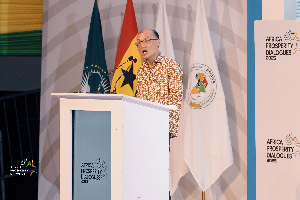On Wednesday, May 27, 2020, the EC met political parties and other stakeholders to put forward its plans for the upcoming presidential and parliamentary elections.
Top on the agenda during Wednesday's meeting was the voter registration exercise which has been a source of controversy for a while now.
Critics of the exercise say the timing of such a major exercise is bad.
However, at the Inter-Party Advisory Committee (IPAC) meeting chaired by Dr Bossman Asare, a Deputy Chairperson of the EC in charge of Corporate Services, the EC went ahead to outline measures for the conduct of the registration exercise.
It was initially scheduled for April but was postponed due to the coronavirus pandemic.
Here are the fallouts from the meeting regarding the upcoming voter registration exercise:
1. The registration exercise The Commission announced that the registration exercise will now begin from the last week of June to the end of July 2020. The Exercise will start each day from 7:00 a.m. to 6:00 p.m. It will take place at all the 33,367 polling stations, which will serve as registration centres nationwide.
The cluster system of registration will be used during the upcoming exercise. It will be done simultaneously in all the districts/constituencies nationwide with each cluster consisting of five registration centres. In all, there will be five phases during the registration period with each Registration Team working for a period of six days in each phase within the cluster.
2. Criteria for eligibility An applicant must be; a) A Ghanaian Citizen b) 18 years of age or older c) Of sound mind d) Resident or Ordinarily resident in an electoral area e) Persons not prohibited by any law in force from registering as a voter
3. Mop-up At the end of the main registration exercise, the Commission will use three days for a mopping-up exercise. The mopping-up exercise is meant for eligible applicants who could not be captured during the main registration exercise.
4. Piloting According the EC, there will be a pilot exercise at different locations in all 16 regions as well as at the national level at the EC’s Head office in Accra. The exercise is aimed at identifying possible problems associated with the new system and find ways of mitigating them. It will also help to study and ascertain the environmental impact on the Voter Management System in respect to the weather (wet, dry, heat, and rust) conditions amongst others.
5. Anti-coronavirus measures The Commission last week announced some safety measures at each registration centre to ensure the safety of all applicants and registration officials during the exercise.
The measures include: - Electorates will be required to maintain a minimum distance of one metre while in a queue to register - The wearing of a face mask has been made compulsory before one enters the registration centre. - The temperature of electorates will be checked before they are allowed at a registration centre - Electorates will be required to wash their hands before they join a queue or begin the registration process. - EC’s scanners will be wiped with alcohol wipes before capturing finger prints and electorates will be provided with hand sanitiser before they leave the registration centre.
6. Proof of eligibility Any one of the following documents can be presented at the Registration centre by an applicant to prove their eligibility: 1. A Passport 2. Ghana Card 3. In the absence of the two documents above, an applicant will need two guarantors who are registered voters to guarantee his/her application for registration. A guarantor can guarantee for up to ten applicants.
The Commission has advised political party agents to refrain from physically preventing suspected unqualified applicants from registering, urging them to rather resort to the challenge mechanism.
7. Security The Commission has written to the Police for assistance to protect the Registration materials and other properties of the Commission before, during and after the exercise.
General News of Thursday, 28 May 2020
Source: www.ghanaweb.com

















